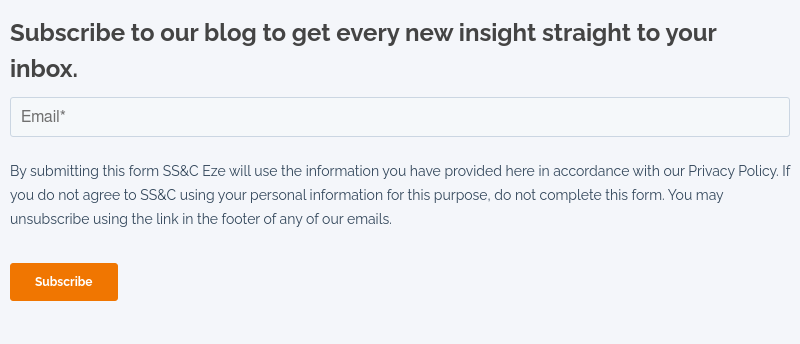In today's rapidly evolving investment landscape, alternative managers face a complex web of challenges, from keeping up with the expansion of electronic trading to mounting compliance requirements and the growing operational risks associated with manual processes.
Fortunately, strong front-office operations can help alleviate these pressures.
However, the front office can’t do it alone.
A common misconception among emerging investment managers is that the firm should prioritize flashy front-office tools for trading, portfolio management, and compliance and that back-office solutions can be tacked on as the firm grows.
While it is true that there are many valuable back-office tools on the market that can be added to an existing investment infrastructure, front-office operations have major implications for the entire downstream process, so it is critical that these solutions align.
To make sure your systems work together in this way, it’s necessary to consider your operations holistically from the start.
This blog explores the front-office considerations alternative emerging managers should make, the downstream implications of these choices, and how achieving a unified investment infrastructure can set your firm up for long-term success.

Front-office Considerations for Emerging Fund Managers
The primary front-office considerations emerging managers must make include portfolio management, trading, and compliance.
- Portfolio Management: This tool should provide a comprehensive platform for tracking and analyzing fund performance. It should offer real-time visibility into market values, positions, P&L, and risk exposures to facilitate informed decision-making.
- Trading: Trading tools should provide end-to-end visibility across the trading lifecycle, from order management and routing to execution and settlement. A single source of truth should provide a current view of positions, removing dependence on third-party systems for updates and simplifying order management. It should also equip users with on-the-fly strategy-level allocation tools and trade analytics to gain insights into trading results.
- Compliance: This component should offer automated and customizable pre- and post-trade checks to ensure adherence to client mandates, investment policies, and industry regulations.
Ideally, each of these tools should connect seamlessly with the firm’s middle- and back-office operations.
The Downstream Implications of Strong Front-office Operations
When a firm’s operations work together seamlessly, its front-office infrastructure enables more efficient and compliant middle- and back-office operations.
However, these benefits can only be achieved if the front office is truly unified with the rest of the operation.
Achieving a Unified Investment System
While it might seem tempting to piece together a technology stack from various vendors to achieve this outcome, a patchwork approach can become inefficient and carry a high risk of errors.
Investing in a holistic solution early on allows emerging firms to streamline operations, reduce errors, and gain a strategic advantage that can help them compete with more established players who are often forced to cope with disjointed legacy systems.
The easiest way to ensure your systems connect is to choose a single, trusted vendor with which to build your investment ecosystem.
This single-vendor approach offers alternative managers significant advantages:
- Seamless Experience: A single vendor can ensure that their products work together seamlessly, eliminating the need for expensive integrations.
- Reduced Complexity: One vendor simplifies IT management and support processes, reducing the time and effort required to resolve issues.
- Enhanced Data Management: A unified platform can provide firmwide data consistency—a single book of record or “source of truth” that portfolio management, trading, and operations teams can all rely on to be current and accurate.
- Scalability: A trusted vendor can offer solutions that grow with the firm, providing the solutions and support they need today, along with the tools they’ll need for the future.
By investing in an end-to-end technology solution from the outset, emerging alternative fund managers can not only streamline operations and mitigate risks but also set up for long-term success.
Learn how you can set your firm up for success with a holistic approach to investment operations. Download our whitepaper, Patchwork Doesn’t Work Anymore: Moving Forward With a Streamlined Investment Platform.
Or learn about Eze Eclipse, a born-in-the-cloud solution focused on the needs of startup and emerging hedge funds looking to optimize operational efficiency and minimize total cost of ownership. Eclipse supports the full investment process within a single, unified platform accessible through a secure web browser interface. See Eclipse in action.
.png)

